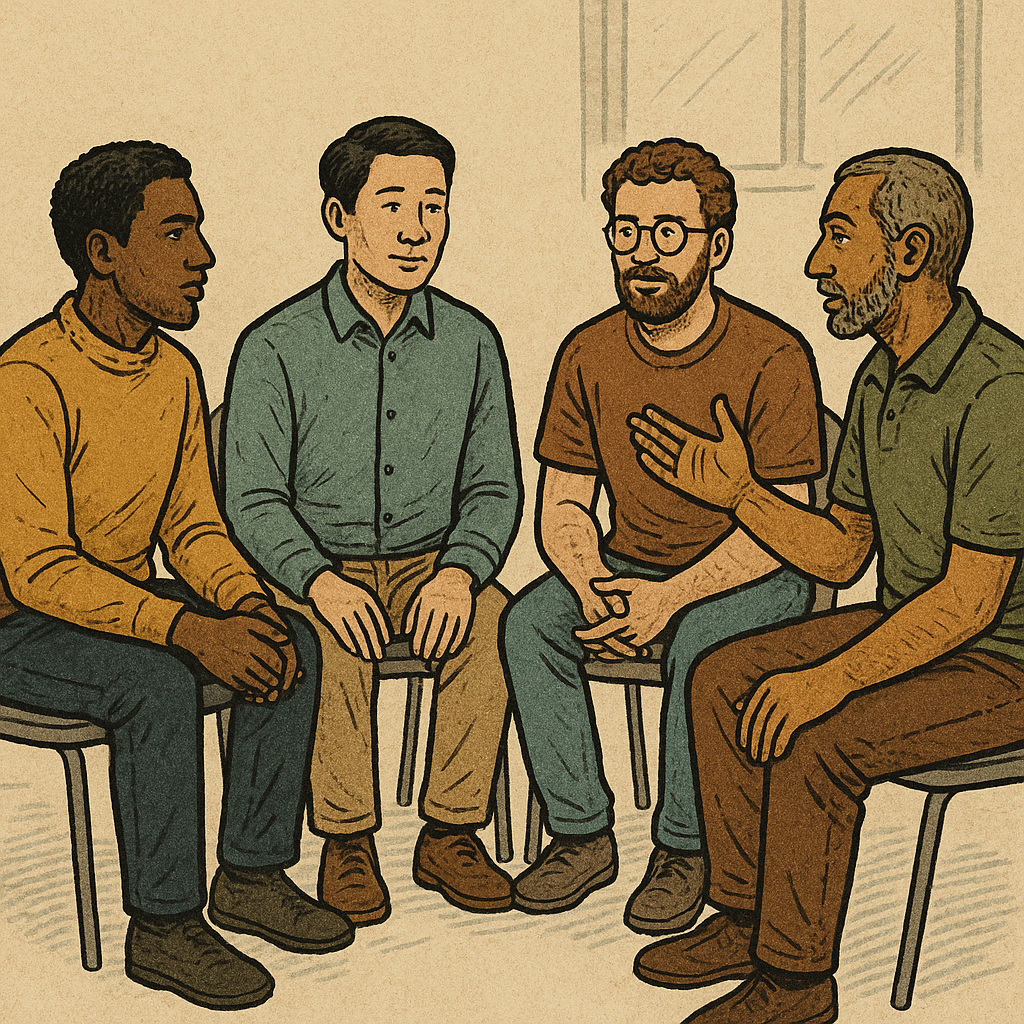Competition and Men’s Wellbeing in the Workplace
Written by Toni Hanna
5 min read

Men are human first. Before they are measured by job titles, income, or leadership roles, they are people who thrive on connection, collaboration, and safety. Yet from an early age, many boys are taught to compete, to win, and not to show weakness. By the time they reach the workplace, competition can feel like the only gear they know.
In a recent conversation with Steve, our Men’s Specialist Practitioner, he named competition as one of the central pressures impacting men’s wellbeing in the workplace. Steve sees every day how competition can motivate achievement but also how, unchecked, it can isolate men and undermine trust. His insights guided the reflections that follow.
The Cost of Constant Competition
Competition has its place. In sport, it pushes performance. In academia, it sharpens learning. In the workplace, it can drive results. But when competition becomes the default mode, men can lose the ability to shift gears. Colleagues become rivals. Trust erodes. Mistakes get hidden rather than admitted. Over time, this can leave men respected for output but isolated as human beings.
The culture of competition does not stop when the workday ends. If sharpness, control, and power come home, relationships can suffer. Aggression, defensiveness, or the need to be right can create deep cracks in families. For men, this is especially risky. Relationship breakdown is one of the strongest predictors of suicide and declining health. Without learning how to replace competition with cooperation and communication, men can feel lost in the very place where they most want connection.
What Men Really Need
Men often struggle to admit vulnerability, not because they do not feel it but because they have not been shown how to be safe in it. Many feel they must always know the answer. As one young practitioner, Jordan, put it: before men can even desire the intimacy women often seek, what they long for first is calm and peace. Chased by career goals, income targets, and the pressure to climb, many men live in a constant state of siege.
When men are given spaces to pause, they rediscover what they already carry inside: the human need for respect without judgment, for peer connection, for skills to name feelings beyond anger, and for the relief of being seen as more than their role. These are not “soft” qualities. They are human ones. And when they are missing, both workplaces and families bear the cost.
Why This Matters at Work
In corporate environments, unspoken competition undermines psychological safety. Teams hesitate to admit limits. Leaders risk using control instead of care. And employees quietly register the tone. A workplace that prizes performance without connection becomes brittle. By contrast, workplaces that invest in men’s wellbeing see gains in retention, trust, and engagement.
Men who feel safe to speak openly bring more of themselves to their roles, and that lifts the whole culture. Programs like We Belong EAP are designed to help workplaces build that culture of safety and belonging.
Extending Care Where It’s Needed Most
It is true that suicide risk is highest among men in trades, transport, and regional areas, where support is less available. That is why Shemewé Collective also invites corporations to partner in the Engage with Shemewé program, a way to invest philanthropic or social capital in men who would not otherwise have access to wellbeing support.
By resourcing circles and sessions in these communities, your organisation can extend its care beyond its own employees and into the wider workforce that sustains our economy.
Our Commitment
At Shemewé Collective, all of us work with men, and our Men’s Specialist Practitioner, Steve, leads the Men’s Wellbeing Circles as part of our We Belong EAP. These groups create space for men to step out of competition and into connection. We also offer one-to-one sessions for private support.
Alongside this, our Couples Group and Parent Group give employees and their families the chance to strengthen the relationships that matter most.
Invitation
If you are an HR or wellbeing leader, you know that competition has value, but not when it costs men their health and families their stability. Let’s create a culture where men can both perform and belong.
Contact us today to explore how our We Belong EAP can support the men in your workplace, and how the Engage with Shemewé program can extend your organisation’s care to men in industries and regions where support is hardest to reach. Visit the Shemewé Blog to read more on inclusive wellbeing and relational leadership, or connect with us to start the conversation.